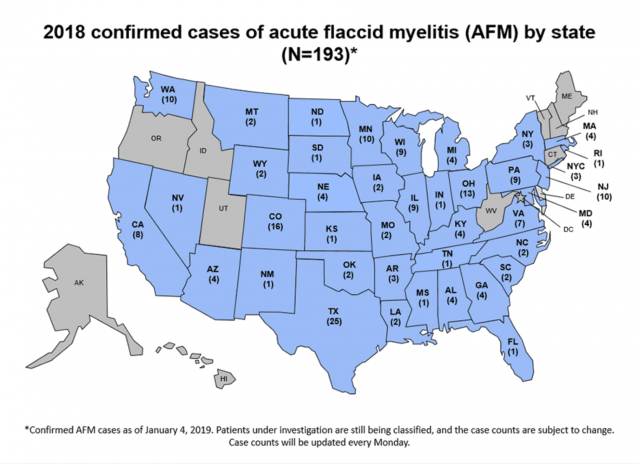USA – The Polio-like illness that has CDC studying and tracking seems to be bi-yearly. “Most patients had onset of AFM between August and October, with increases in AFM (Acute flaccid myelitis) cases every two years since 2014. At this same time of year, many viruses commonly circulate, including enteroviruses, and what association it may have with AFM,” said the CDC.
According to the CDC,”Acute flaccid myelitis (AFM) is a rare but serious condition. It affects the nervous system, specifically the area of the spinal cord called gray matter, which causes the muscles and reflexes in the body to become weak. CDC has been thoroughly investigating the AFM cases that have occurred since 2014, when they first noted a large number of cases being reported.” Most of the people affected by this illness are children.
Ohio in 2018 had the third largest confirmed cases at 13, only behind Colorado and Texas. Amoung the unconfirmed cases, there are now 349 under investagtion for the possibility of the illness. Oregon, Idaho, Utah, Alaska, Hawaii, West Virginia, Delaware, Connecticut, New Hampshire, Vermont, and Maine have so far not had confirmed cases of the disease.
Clinicians should continue to be vigilant and send all information about patients that meet the clinical criteria for acute flaccid myelitis (AFM) (sudden onset of flaccid limb weakness) to their state or local health department. Since AFM is a relatively new condition, we need information on all patients to help us better understand the spectrum of AFM illness, all possible causes, risk factors, and outcomes for this condition. Clinicians should send information on patients who meet the clinical criteria regardless of any laboratory results or MRI findings, according to CDC.
A task force was formed in November of 2018.“I want to reaffirm to parents, patients, and our Nation CDC’s commitment to this serious medical condition,” said CDC Director Robert R. Redfield, M.D. “This Task Force will ensure that the full capacity of the scientific community is engaged and working together to provide important answers and solutions to actively detect, more effectively treat, and ultimately prevent AFM and its consequences.”
AFM is a rare condition that affects a person’s nervous system, specifically, the spinal cord, causing weakness in one or more limbs. Beginning in 2014, the United States has seen an increased number of AFM cases, mostly in children. In 2018, there have been 193 confirmed cases of AFM in 29 states; all but five have been in children ages 18 or younger.










